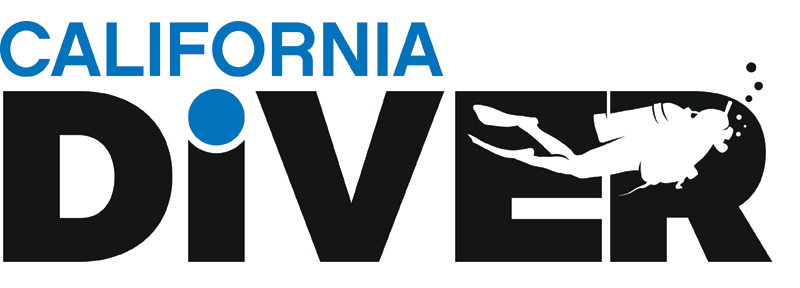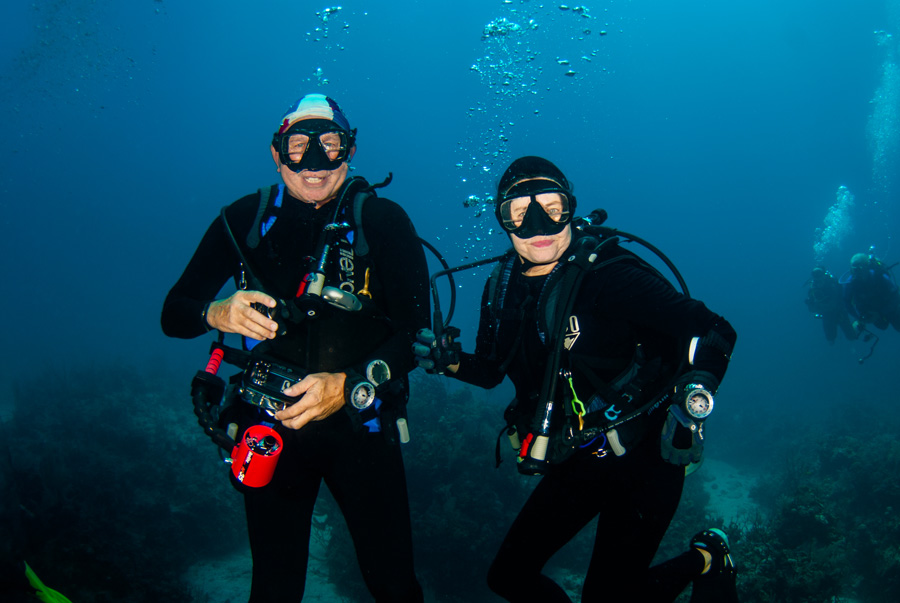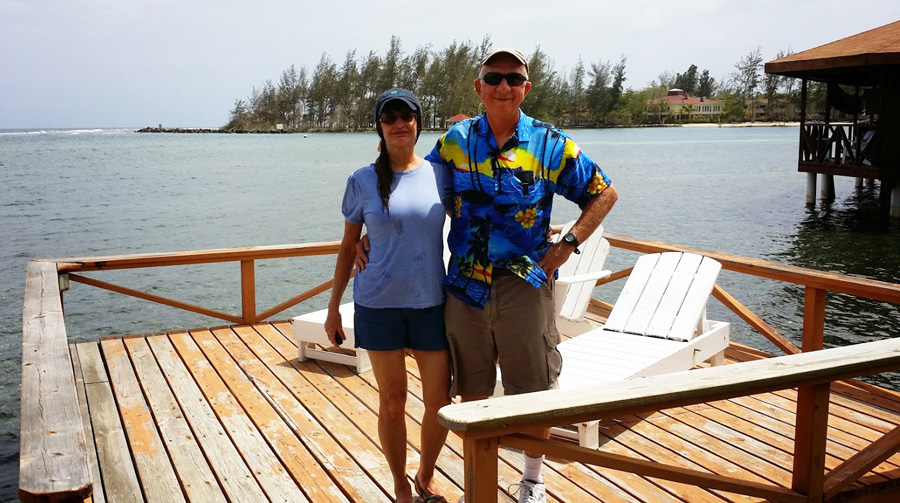Scuba diving is an experience of mind, body and spirit that only divers fully understand. So much so, that the desire to dive gives purpose to practical matters of living well, such as exercising, eating healthy and working hard in order to participate in the sport for as long as possible. It is even more evident, when illness or injury leaves a diver high and dry and we have the opportunity to not just watch and learn, but to encourage and help as he/she does whatever it takes to return to the water. James Holmes and his wife and dive buddy, Cherry Sue, share his inspiring story of surviving, thriving and diving.
How long have you been SCUBA diving and what certifications do you hold?
I started diving in 2003 at 57 years old. My wife and I started together. We hold Master Diver, Search and Rescue, and Cavern Diver Certifications. We are close to 900 dives.
Who do you dive with? Dive Club – Buddy?
I dive with my best friend, my wife. We belong to the Wateree Dive Club in Columbia, South Carolina.
Where and what type of diving do you enjoy the most?
We love diving the cenotes in Mexico, the wrecks off of North Carolina, dive trips in the Pacific (Fiji, Palau, and Truk lagoon), shark dives anywhere, Bonaire, and Grand Cayman. Least favorite diving is in Lakes but I Spear catfish to keep it interesting. We are especially fond of live-aboards because of the number of dives. We always do the maximum number of dives on a trip. We love night diving. Basically, if we are under the water diving, we love it.
You are 70 years of age. How do you maintain longevity in diving?
My wife and I go to a gym with a 25-yard swimming pool with swim lanes Monday through Friday. We swim twice a week and I swim a two-mile swim every Monday and swim sprints on Thursday. The elliptical and weight training take up the other three days. My wife does the same thing except for the two-mile swim. She only swims one mile. We eat very little red meat or sweets, and lots of fruits and vegetables. We are both very positive people about life and support each other in our endeavors. So exercise, diet and a good buddy are the secrets to diving vigorously at 70 and 69 (wife’s age)
You are a cancer survivor. What type of cancer did you experience?
In October of 2010, I was diagnosed with Renal Cell Carcinoma, Stage 4, Kidney Cancer. I had a tumor the size of a softball attached to my left kidney and 13 small tumors scattered throughout my lungs. The large tumor and kidney were removed in Columbia, SC. About 16 months later I was diagnosed with a brain tumor (metastasized kidney cancer) about the size of a golf ball.
Which treatments, advice, decisions worked best for you and your recovery? How was this the same or different from doctor recommendations, and other patients?
I went to MD Anderson (MDA) in Houston, Texas after the surgery because they are the best cancer center in the U.S., and deservedly so. My oncologist at MDA told me that Chemo and Radiation did not work on this type of cancer, but might extend my life by about a year. Obviously, surgery was out of the question for the tumors in my lungs. My oncologist at MDA stated that I could survive an average of three years with some experimental Chemo, but my quality of life would be reduced by 15% for the remainder of my life (negative effects of Chemo). He gave me an option of immunotherapy with a success rate of 5% with a 1% chance it would cause an early death. He described the therapy as brutal. He was wrong, it was worse.
I went through three treatment cycles consisting of one week in ICU each time. Every eight hours the nursing staff would intravenously give me High Dose Interleukin II(IL-2) immunotherapy and kept giving me fluids intravenously continuously. The closest thing to describe my reaction to each dose was minor convulsions for about 15 minutes. After nine consecutive treatments and a gain of 45 pounds in three days, the doctor made me stop treatments because of the increasing negative effects IL-2 had on my remaining kidney. They had approximately eight rooms with others going through the same treatment. I was the oldest in the group and completed more treatments than any of the other patients. Each patient would be given a choice to continue or quit before the next dose. The fourth day, after the treatments, I felt pretty close to death. I was de-watered for the next three days.
I went back two more times for this treatment but was only allowed 8 rounds of IL-2, again I was the oldest and completed the most both times. I had an ace in the hole for this treatment, that most do not have. I had an angel in the room with me throughout the treatment 24 hours/day….”My Wife”. She prayed over me and took care of my every need. I got over the treatment much faster than other patients because I got up and walked between doses. I went back to work when I returned home. Many convalesce for two weeks. The treatments were about six weeks apart, but basically nine of the 13 tumors were eliminated. The other four tumors are scattered over both lungs and are growing extremely slow. I go back to MDA about every four months and sometimes they cannot tell if they have grown.
It is now six years since the diagnosis and the tumors are still being monitored. Surgery is an option but it is not recommended due to the slow growth. My lung capacity is not impaired and the tumors are not close to any lymph nodes. To sum it up, walking vigorously between doses, my angel in the room, my faith, my positive can-do attitude, my good health before treatments, and MDA, were all contributors to my success so far with cancer. As a side note, part of the reason I decided to go forward with the treatment was my excellent health. I was not being arrogant when I told the doctor the reasons for my decisions. But this is what I remember saying. “I have never smoked, I exercise regularly, I am not over weight, and therefore I am not your average person. I give my odds of success 20%. Do you disagree?” He said, “I cannot disagree with that.” I said “Then let’s make it happen.”
One more important point concerning doctors, hospitals and scheduling. When I found out I had life threatening cancer, I did not allow doctors or hospitals to control my schedule. I found out I had kidney cancer on a Friday after an MRI of my kidney and lungs. I went to my doctor that afternoon without an appointment and told the front desk that he would see me and walked back in the inner waiting room. The nurse there said do you have an appointment? I said no, but he is going to want to see me (He told me over the phone I had cancer). He saw me right away, then he prayed with me, and I said you need to promise me two things. I want an appointment with both a surgeon and an oncologist on Monday. I was informed that evening of appointments with both on Monday. I did not want to offend my local oncologist, but had already made up my mind I would go to MDA. My surgeon scheduled me for surgery in two weeks to remove the kidney and tumor. The local oncologist set me up with a referral to MDA for early January which was the earliest possible because of surgery. At MDA I was scheduled for my first IL-2 treatment in late April. I talked to the head nurse where the IL-2 treatments were scheduled and said why do I have to wait that long? She said the doctor I was referred to for the treatment did not have an opening until then. She helped get me a different doctor and my first treatment was in Mid-January. I looked up that Nurse and hugged her when I arrived.
What about the Brain Tumor?
Everything was looking good until February of 2012, when the right side of my body started shutting down. I had not told anyone of my symptoms and my son next door just thought I was aging fast. I was scheduled to go diving with my wife at West Palm in Florida for a weekend trip. I realized that I would jeopardize my wife while diving and confessed on Thursday of my problems. She made me call MDA. I was told to go to the local emergency room immediately. They did an MRI on my brain that night and the young doctor came into the room to inform me of the tumor. He tried to be positive, but with tears in his eyes he said ” I am so sorry” and left the room. My reaction was very serene. I had already faced death so it was not that emotional for me. My daughter-in-law is a surgical tech and had good connections at the hospital and knew who was the best brain surgeon. She contacted him indirectly and he came in on Saturday (on his day off) to see me. He had ordered more MRI’s before then. He set down with my entire family and went over the surgery proceedings in detail. The tumor was in a difficult place and he gave me odds of 90% success, 5% disability, and 5% death. After the odds I had already dealt with this was a sure thing. I had surgery Monday evening and was released from the hospital Wednesday morning. MDA did brain MRI’s to look for more issues until this year. None have shown up.
Your story of survival is profound. Are there aspects of your rehabilitation which you think might be helpful to others?
Yes. First, a good relationship with God. It is hard to get depressed when you have that. Second, a loving companion that can see you through all the trials. Third, staying physically fit in both strength & cardio, even when you are beat down with treatments etc. Fourth, a great diet with little or no red meat, and lots of fruit and vegetables. Fifth, I have three children, three in-laws and four grandchildren that are loving and very supportive. Sixth, I never smoked, otherwise I would not have been a candidate for the treatment, because of my age at the time.
What kept you going through your recovery?
Certainly diving was a strong motivation to keep going. I have to confess my recoveries were quick from IL-2. I would be released on a Monday at MDA, travel two days to get to Columbia, SC and be at work on Thursday. My recovery from kidney surgery took about a month, due to the healing process from being cut. My family took care of things I couldn’t during that time. There was basically no recovery time from brain surgery. I was back to normal life, except strenuous exercise, two days after surgery.
Cherry Sue is your dive buddy and your life buddy. What practical helps does she bring to you, i.e. nutrition disciplines, encouragement and support?
Cherry Sue makes a smoothie every day for me. It has some 27 ingredients that are all cancer fighting. Most of the dry ingredients she gets on line and we blend about a month’s worth at a time. It looks like a chemical lab. We read books and articles on fighting cancer early to get many of the ideas for the smoothie. I will say I was doing most things right before cancer except my diet. She brings home nutritional food most of the time. I love pizza, hamburgers, fries, desserts, hot dogs, chips etc. You get the picture. I had a terrible breakfast. Now it is a smoothie in the morning, fish and vegetables for lunch, and sometimes I can splurge a little for supper. She has her hands full. She is my workout buddy and we mutually encourage each other to go to the gym. I am very involved with two of my granddaughters on year-round swim teams. I was a coach and swimmer. She helps support that interest.
You are an inspiration to others and especially to other divers. Does diving motivate you toward wellness? If so, why?
Absolutely, I have two extreme motivations to stay physically fit. I want to beat cancer for my family, and staying physically fit is very important part of that. The other motivation is I want to dive, and dive and dive some more. Staying physically fit is a vital part of that goal, especially at 70 years old. The older we get the more important diet and exercise become.
What are the good things that have occurred, if any, as a result of your six-year battle with cancer?
There are several wonderful and meaningful things that have occurred as a result of my battle with cancer. I had a rotator cuff injury on my right shoulder that would not heal. One month of rest after my kidney surgery healed it up. I had MRSA (methicillin-resistant staphylococcus aureus) from a tick bite years earlier. IL-2 cured the infection. My daughter lives in Baton Rouge, La. I saw her once per year at Christmas. I stay with her every time I go to MDA and as a result I have developed a super relationship with her. The cancer experience has made me realize how precious life is. Every time I dive, I am very thankful for the opportunity to experience Gods wonders. I wanted to spend more time with my two granddaughters next door. In 2011, I began training them for competitive swimming (I coached 40 years ago). They are on year-round swim teams today and I take them to practice every day. I am a stroke and turn judge for the high school and summer swim teams. I accepted a deacon’s position at my church in 2013.
Words and Photos by Gretchen M. Ashton, CFT, SFT, SFN, NBFE


